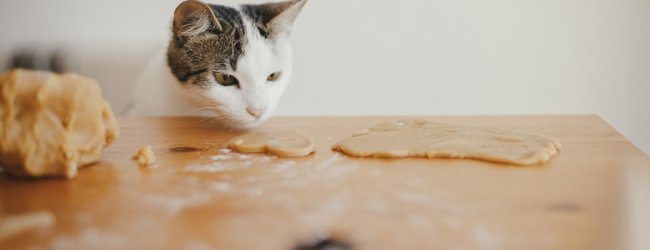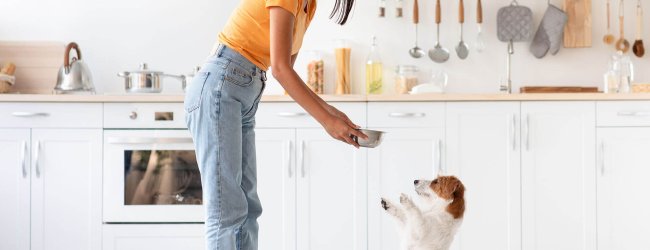 Approved by Dr. Dwight Alleyne, DVM
Approved by Dr. Dwight Alleyne, DVM What Can Dogs Not Eat? 15+ Foods Poisonous To Dogs
Holiday season or not, dogs tend to beg around kitchen counters pretty often. But did you know a whole bunch of human foods are toxic to them? Here are 15 foods that are absolutely off-limits for dogs - and what to do if you suspect they've eaten something they shouldn't have.
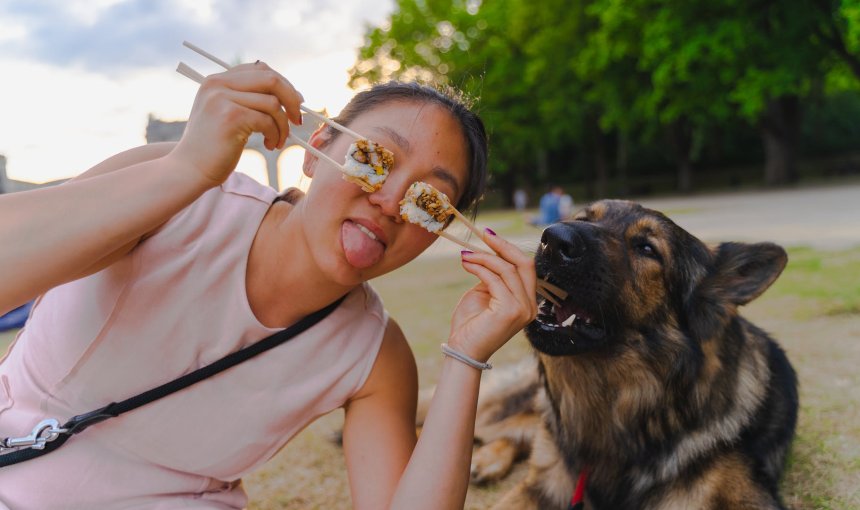
Dogs are not picky eaters. They’ll wait for dinner table scraps or eagerly lick your plate. They’ll eat nearly anything. But what can dogs not eat? Let’s explore which foods your dog must avoid to stay safe and healthy – and how tracking their activity can help you catch on to an illness even if they seem happy and healthy.
Key Takeaways
Everyday food items like chocolate, grapes/raisins, onions, garlic, alcohol, and caffeine can be extremely harmful or even fatal to dogs. These foods may cause symptoms ranging from vomiting and diarrhea to organ failure and death
Head to your vet if your dog shows signs of food poisoning, like vomiting, diarrhea, tremors, lethargy, seizures, excessive drooling, and loss of coordination.
Keep human food and snacks out of reach, secure trash bins, educate family members about unsafe treats, and supervise your dog around unfamiliar foods – especially during holidays and gatherings.
The Tractive GPS & Health Tracker includes vital signs and activity monitoring, which helps detect early changes in your dog’s behavior, breathing, or heart rate that may signal poisoning – so you can act quicker and potentially save your dog’s life.

Always know your buddy is healthy & safe
Read moreWhich dogs are at risk?
Any dog can be at risk for eating food that they shouldn’t. But dogs that are naturally curious, poke their nose into everything, or frequently put things in their mouth are at greater risk. Many times, this might be due to habits or learned behaviors. (Meaning, your dog might’ve learned that certain family members are easier to coax into giving them treats than others.)
Small dogs may be at increased risk because lesser quantities of toxic food can cause a severe reaction due to the dog’s tiny size.
You know your dog’s personality and habits best. So it’s up to you as a pet parent to supervise your dog’s behavior at mealtimes, picnics, and family gatherings. Also, make sure to store all toxic foods far away from where your pup can reach.
Should your dog eat the same food as you?
Dogs’ digestive system and teeth are adapted to an omnivorous diet, which means they can eat both plant and animal foods. They can eat some types of human food – like some fresh fruits, vegetables, and lean meat – in small quantities.
However, feeding your dog only table scraps will probably not meet your dog’s nutritional needs. In fact, in some cases, you might accidentally feed your dog something that might even harm them! As a bonus, if you stop offering table scraps, your dog will stop begging at mealtime. Commercial or homemade dog food that meets the nutritional needs of your dog is better than table scraps. It includes the essential vitamins and minerals needed for your pup’s optimum health. And, you can be sure that it is safe for your pup to eat.
What can dogs NOT eat? Top toxic foods for dogs
Many foods that we humans consume every day can cause vomiting, diarrhea, kidney problems, seizures, or even death in dogs, depending on the size of your dog and how much toxic food they eat. Make sure your buddy stays away from:
| Food/Substance | Which may cause: |
| Anything with caffeine, including coffee, tea, soda pop, or energy drinks. | Caffeine poisoning, which might turn up as heart palpitations, rapid breathing, muscle tremors, and restlessness. |
| Chocolate, which contains theobromine | Tremors, abnormal heartbeat, seizures, and even death. |
| Onions, garlic, leeks, and scallions, which contain sulfoxides and disulphides | Anemia from damage to your dog’s red blood cells |
| Grapes and raisins | Sudden kidney failure or even death |
| Dairy products, which contain lactose (cheese, milk, or ice cream) | Gas, bloating, abdominal pain, diarrhea |
| Raw meat, eggs, & fish (including bacon, bacon grease, or fat trimmings from meat or bones) | Food poisoning, vomiting, diarrhea, or even pancreatitis |
| Bones | Choking hazard |
| Spicy food | Vomiting, diarrhea, and stomach ulcers |
| Salt (from food, bur also homemade playdough or rock salt used to de-ice the driveway) | Vomiting, diarrhea, tremors, seizures, altering of your dog’s fluid balance |
| Most nuts, including macadamia nuts, almonds, and pistachios | Poisoning, choking hazard |
| Mushrooms | Poisoning |
| Tomatoes & raw potatoes | Gastrointestinal problems |
| Yeast & raw bread dough | Bloating, severe pain |
| Anything with Xylitol (an artifical sweetener present in candy, gum, diet foods, yogurt, and baked goods) | Low blood sugar, seizures, and liver failure |
| Tobacco & nicotine products | Vomiting, diarrhea, rapid breathing, agitation, seizures, tremors, and weakness |
| Alcohol | Rapid drops in body temperature, seizures, respiratory failure, or even death. |
What to do if your dog eats something they shouldn’t have
Despite our best efforts, dogs eat things that they shouldn’t. So be prepared to act quickly should an emergency arise.
- Stay informed on what dogs can’t eat
Try to keep them out of your home or stored in a place that’s inaccessible to your pup. - Stay in contact
Add the phone numbers for your veterinarian’s office, the local emergency animal clinic, and the ASPCA Animal Poison Control Center to your phone contact list today. So you don’t waste valuable time searching for who to call when an emergency happens. - Stay calm if your dog accidentally eats something they shouldn’t have
Try to identify the exact type of food consumed. Contact your veterinarian or the local emergency animal clinic if it’s after hours. The ASPCA Animal Poison Control Center is available 24 hours a day to offer advice if you suspect your dog has eaten a toxic substance.
After receiving treatment for poisoning, your dog may need to be on a special diet as they recover. White rice with no butter, oil, or salt can be a good starter food for your dog’s recovery. (Because it’s bland and easy for your dog’s digestive system to handle.) Your veterinarian will make specific dietary recommendations for your dog’s recovery.
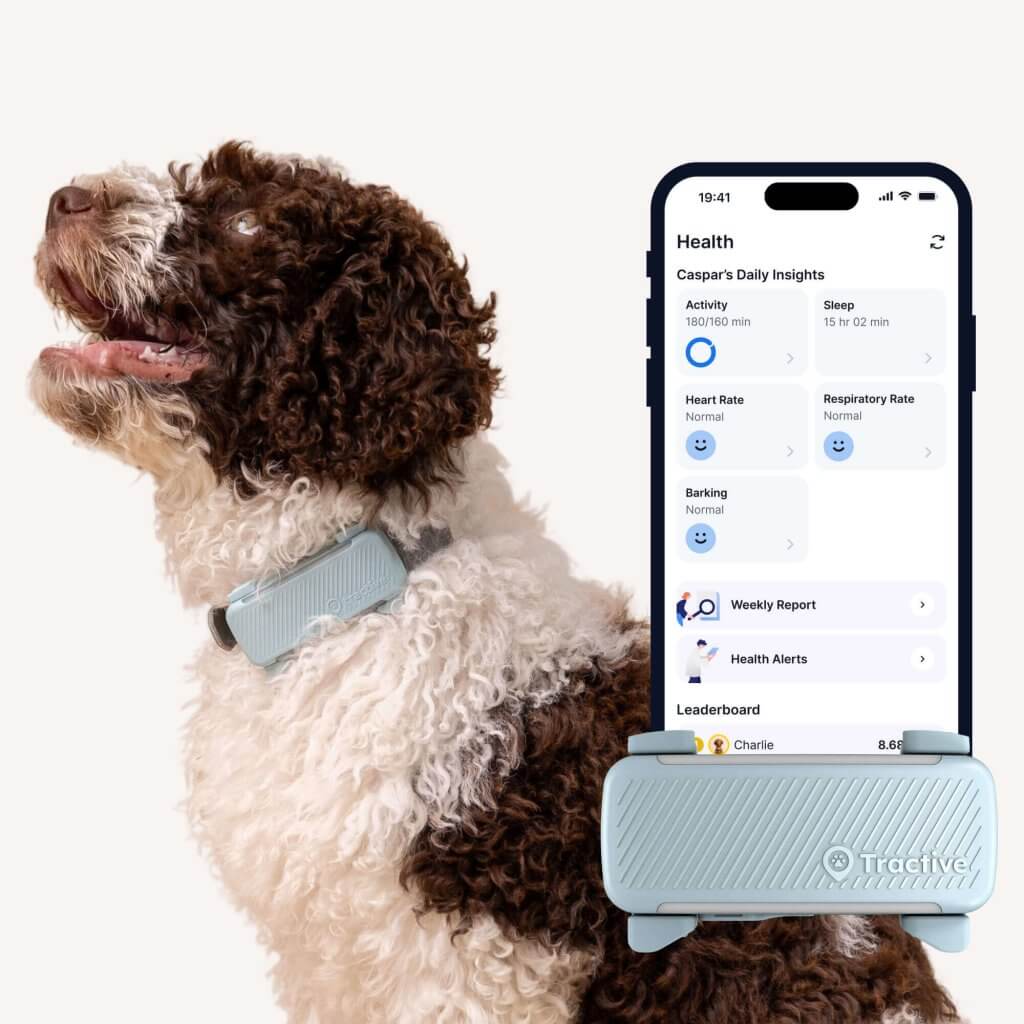
Get health alerts for your dog
Our pups can’t always tell us if something’s wrong. But if their tracker detects unusual changes in their routine, you’ll get an alert, helping you catch potential issues early.
Signs of food poisoning in dogs
We’ve covered how certain foods can result in different symptoms for your dog. So here are some of the signs of food poisoning from WebMD1, if you suspect your buddy’s eaten something they shouldn’t have.
- Gastrointestinal symptoms, like vomiting, diarrhea, or cramping.
- Panting and salivating
- Excessive thirst
- General signs of malaise, like nausea and dizziness
- Changes in your dog’s activity levels, including lethargy or hyperactivity
In other, scarier cases – your dog might actually seem completely normal and healthy, while still struggling with illness or discomfort.
💡Which is why vets recommend regular activity tracking to stay on top of your dog’s daily movement. And which can actually help save your dog’s life.
Where a smart dog tracker can step in
A change in your dog’s activity levels is usually a more subtle sign they might be sick. Admittedly, it’s also not the easiest to keep track of. That’s where technology can lend a hand.
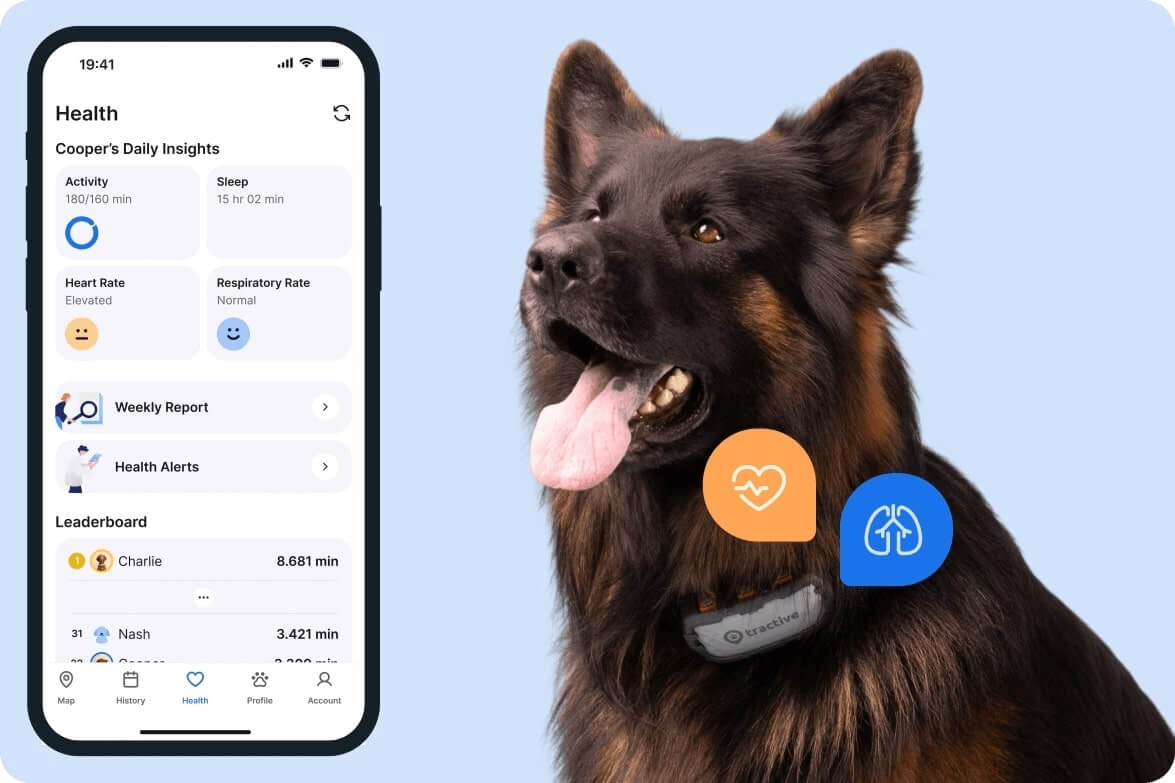
Strapped to their collar, your dog’s Tractive GPS & Health Tracker can help you:
- Track your dog’s every move
With real-time GPS tracking helping you figure out what spots around your neighborhood your dog might be getting some extra “snacks” from. - Monitor your dog’s vital signs
Both excessive panting and an elevated heart rate could be signs your dog is struggling with indigestion or even poisoning. So from your Tractive mobile app, you can catch on to these signs quicker and take action earlier. - Spot a potential health issue before it has a chance to worsen
With its built-in motion detector, your tracker picks up on your dog’s movements throughout the day. So if there’s a weird drop in your dog’s daily activity – which could signal something’s wrong – your tracker sends you a Health Alert. Helping you take action early and get them to a vet for a checkup before their health takes a turn for the worse.
Your furry friend’s health and wellbeing means as much as to us as it does to you. So we’ve made it a priority to only share medically-relevant content on our blog. This post was checked, double-checked, and medically verified by Georgia-based vet, Dr. Dwight Alleyne.

Dr. Dwight Alleyne, DVM
Originally from Long Island, New York, Dr. Alleyne began his career at a no-kill animal shelter before becoming a licensed veterinary technician. He graduated from Cornell University Veterinary College in 2006 and completed an internship at Purdue University. Now practicing in Georgia, Dr. Alleyne specializes in soft tissue surgery and ultrasounds. He also writes pet health articles on his website, “The Animal Doctor Blog” (www.anmldrblog.com).
